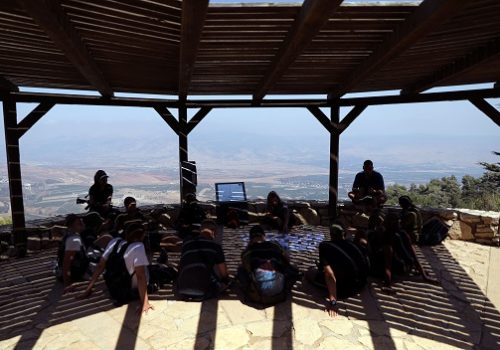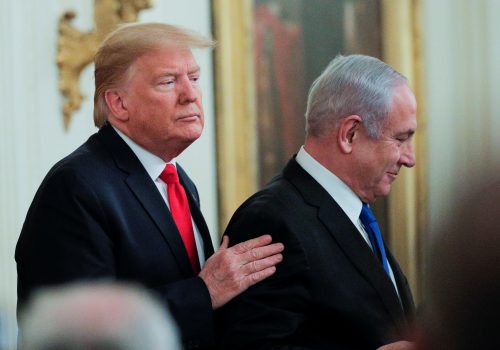Israel’s new prime minister must reckon with the Democratic Party
On March 2, Israelis head to the polls for the third time this year to pick their prime minister. Recent polls put Prime Minister Benjamin Netanyahu and his challenger Benny Gantz in a dead heat. The victor is in for a bumpy road, not least the struggle to form a government. And by March 3, he will have a preview of one of the first challenges he’ll have to address: a reckoning with the Democratic Party.
Israel and the Democratic Party have entered into unchartered waters in recent years. President Donald Trump and Netanyahu have both sought a concerted policy of politicizing the relationship and have successfully alienated many Democrats from Israel in the process. This comes at a time when the Democratic party has been changing—the tent has grown wider and the party must now accommodate a new generation with shifting policy priorities and intersectional views. Democratic views on foreign policy are also changing, with calls for increasing restraint, diplomacy and multilateralism likely to triumph over traditional liberal internationalist views. At the same time, Netanyahu’s right-wing policies and incendiary politics have angered many Democrats, stalwart Israel supporters among them. The polls show support for Israel among Democrats is slipping.
Democrats will come back into power—eventually. The Democratic presidential candidate will help set the tone for the party that represents the vast majority of American Jewry—and ultimately for the relationship between Israel and the US when the Democrats do regain control of the White House, if not after the 2020 election, then down the road. Will relations between the two transcend the moment? Be more strained? Repaired? Much will depend on who wins—in both counties.
If Netanyahu triumphs yet again—and he succeeds in both forming a government and holding onto power—his corruption trial is just weeks away. Netanyahu will face continued tensions with almost any future Democratic leader, mostly of his own making. Netanyahu is in the political struggle of his life, and yet he has only been emboldened. Over the course of three campaigns, he has shown that he is willing to do whatever it takes to hold onto power, and will pander aggressively to his right in courting their support. Netanyahu has made clear his intentions to capitalize on Trump’s peace plan and annex parts the West Bank—a policy all Democrats strongly oppose. Most Democrats have also come to personally disdain him; they find his arrogance and rhetoric repugnant.
If Gantz wins, he will offer Democratic leadership a new face to work with, regardless of the composition of his coalition or the policies he pursues. He has personally vowed to rehabilitate Israel’s relationship with the Democratic party, a welcome shift from Netanyahu’s approach. Ultimately the policies Gantz pursues will influence the course of relations over time, but he offers the possibility of a reset and softened rhetoric that all Democratic candidates will be eager to embrace.
But what can the next Israeli leader expect from the Democrats? Let’s see who comes out ahead on Super Tuesday.
The next Israeli prime minister could get lucky. Mayor Michael Bloomberg has been eager to distinguish himself as a pro-Israel candidate that will unite America’s Jewish community and the Democratic Party writ large. He has a strong record of support—including defying a flight ban to show support for the country amidst war with Gaza—and said he would support Israel no matter who is in power and has touted his support for the country on the campaign trail. But his approach can seem a bit nostalgic at time, and Bloomberg too has called for a two-state solution and has expressed opposition to unilateralism.
Then there’s the cast of candidates in the center—Joe Biden, Pete Buttigieg, Amy Klobuchar—who have adopted fairly similar approaches to Israel. They are supportive of the relationship but are willing to be openly critical. They are frustrated with Netanyahu, willing to call out his behavior, but still represent a more traditional view of foreign policy. They value the national security dimension of the relationship, have defended security assistance to Israel—though Buttigieg has teetered about his willingness to condition that aid—and have demonstrated support for Israel in their voting records and positions they espouse. If any of these candidates are nominated, one can likely expect a continuation of Obama-era policies on Israel: while there were periodic tensions, a willingness to push back, and occasionally even public disputes, but the former president still oversaw the largest aid package to Israel in history.
On the left side of the spectrum is Bernie Sanders, the presumptive front runner. Sanders has been openly critical of Israel, describing Netanyahu as a “reactionary racist” and demanded a more even-handed approach to Israel and the Palestinians. He has expressed a willingness to condition aid to Israel on progress towards peace, and has spoken out on behalf of Palestinian suffering. How and if he would transform America’s relationship with Israel remains to be seen. But he is unlikely to tolerate any expansionist Israeli policies and has a myriad of tools at his disposal to constrain Netanyahu should he so chose. It is not surprising that his rise has sparked widespread fear among Israel’s leadership.
Regardless of who leads the Democratic party, or if they win back the White House in 2020, the US-Israel relationship will remain tantamount to both countries’ national security interests. The leaders in both countries are eager to ensure it persists, and Israel’s next leader will make the policy accommodations necessary to ensure the partnership endures. The tone, however, could change the dramatically—and Israel could be in for a rude awakening. If nothing else, let Super Tuesday be a warning shot for Israel, a reminder of why they need bipartisan support in Washington if they hope to see the relationship not only endure but prosper. It is incumbent on the next Israeli leader to take steps now to repair his relationship with Washington’s future leader.
Carmiel Arbit is a nonresident senior fellow for Middle East Programs at the Atlantic Council, and a co-founder of Key Bridge Strategies. She researches and writes on US-Israel relations and has consulted for NGOs around the world, including in Israel and the Palestinian Territories.
Image: An ultra-Orthodox Jewish man walks next to Likud party election campaign banners (Reuters)


